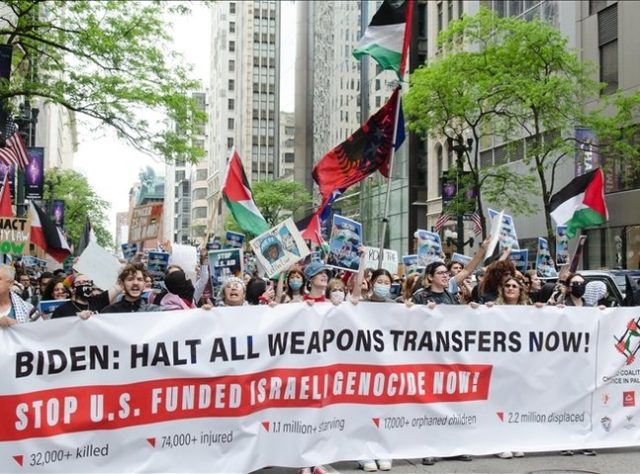The run-up to the U.S. presidential election in November is charged with an atmosphere of unprecedented tension, driven primarily by two key issues: the economy and the ongoing crisis in Gaza.
As Americans grapple with economic hardships and inflation, their frustration is compounded by their government’s role in supporting Israel’s actions in the Palestinian enclave, which many view as genocidal.
Last week, at the Democratic National Convention in Chicago, Illinois, prominent independent Senator Bernie Sanders, who opposes pro-Israel policies, received a standing ovation when he called for a lasting cease-fire in Gaza.
The moment underscored the deepening discontent among voters, who plan to make their voices heard at the ballot box this November.
According to the Institute for Social Policy and Understanding’s April report, titled “Winning Muslim Votes: A Policy Priority Analysis in Swing States,” 78% of Democrats in the U.S. support a permanent cease-fire in Gaza.
Among Muslim voters, 89% of Democrats, 72% of Republicans, and 91% in swing states say a permanent Gaza cease-fire would increase their likelihood of supporting any 2024 candidate.
A Reuters/Ipsos poll from April this year showed that 77% of Americans believe the Joe Biden administration’s economic and inflation policies are on the wrong track, while 55% disapprove of its foreign policies.
The Republican Party has confirmed former President Donald Trump as their candidate, while the Democrats have officially nominated Vice President Kamala Harris.
But both candidates’ pro-Israel stances have alienated many Muslim Americans and those sympathetic to the Palestinian cause, leading to a growing number of voters who are undecided or support third-party candidates.
Muslim-American groups, alongside other undecided voters, have taken an active role in the election discourse.
For four days during the Democratic Convention, these groups staged protests around the convention center, demanding a permanent cease-fire in Gaza and an arms embargo against Israel.
Prominent figures such as Minnesota and Georgia representatives Ilhan Omar and Ruwa Romman participated in the protests, expressing their support for the just cause.
However, Romman’s request to speak at the convention was denied, further inflaming tensions and raising the question of whether the organizers considered the life of an Israeli more valuable than that of a Palestinian.





